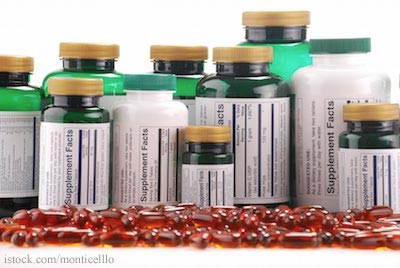New York Attorney General Eric T. Schneiderman has asked GNC, Target, Walmart, and Walgreens to stop selling their store brand herbal supplements immediately because of mislabeling. Cease and desist letters sent to the companies yesterday say tests on the products found 79 percent did not contain plant species identified on the label. And some contained contaminants not identified on product labels.
Supplements do not have to undergo a premarket evaluation by the U.S. Food and Drug Administration (FDA) before they are sold. Manufacturers are responsible for ensuring that their products are safe and accurately labeled. Unfortunately, not all of them do.
In fact, many supplements, especially those sold as weight loss or body building supplements, contain undeclared ingredients that pose health hazards for those with certain medical conditions and interfere with prescription medications. Others have been found to contain banned drugs such as sibutramine, an ingredient in an FDA-approved drug called Meridia, which was removed from the market in October 2010 after being linked to heart problems and strokes.
Dietary supplements account of 20 percent of drug-related liver injuries. The FDA has received dozens of reports of adverse health events associated with dietary supplements sold as weight loss products, including increased blood pressure, racing heart, stroke, seizure and death.
 Schneiderman’s letters ask the retailers to immediately halt the sale of Echinacea, Ginseng, St. John’s Wort, and others herbal supplements sold under store brand names. He also requests that the companies provide detailed information about the production, processing and testing and quality control measures for herbal supplements sold at their stores.
Schneiderman’s letters ask the retailers to immediately halt the sale of Echinacea, Ginseng, St. John’s Wort, and others herbal supplements sold under store brand names. He also requests that the companies provide detailed information about the production, processing and testing and quality control measures for herbal supplements sold at their stores.
According to Schneiderman’s office, the retailer whose supplements had the poorest showing in DNA testing was Walmart. Just 4 percent of Walmart products tested contained DNA from the plants listed on the products’ labels.
“This investigation makes one thing abundantly clear: the old adage ‘buyer beware’ may be especially true for consumers of herbal supplements,” said Attorney General Schneiderman. “The DNA test results seem to confirm long-standing questions about the herbal supplement industry. Mislabeling, contamination, and false advertising are illegal. They also pose unacceptable risks to New York families—especially those with allergies to hidden ingredients. At the end of the day, American corporations must step up to the plate and ensure that their customers are getting what they pay for, especially when it involves promises of good health.”





If I was walmart, Im not sure my response would be to brag that my own testing had failed to detect this. Id probably just say I had trusted my suppliers and would be more careful in the future. But hey, to each their own I guess. Good job, walmart, testing echinechia as wheat chaff or whatever.